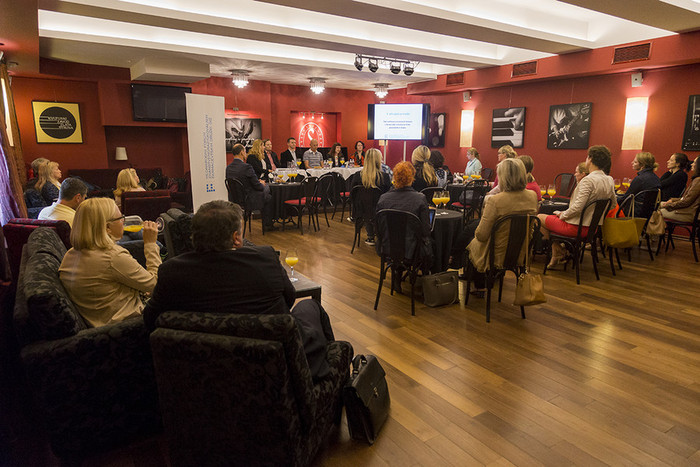8th FIRDPC info breakfast
The influence of healthcare professionals co-operation with pharmaceuticals industry on the profession, the individual and the societyOn June 7, 2016 FIRDPC held its 8th Media Breakfast, this time with the title "The influence of HCPs' co-operation with pharmaceuticals industry on the profession, the individual and the society". The goal was to talk about why HCPs need pharmaceutical companies, why the latter need HCPs and how this co-operation is changing the lives of people and the fabric of society.
In a welcome statement Katarina Verhnjak, FIRDPC board president, spoke about how development of new medicines is always a result of combining expert knowledge with practical experiences and that is why co-operation between all sides – patients, doctors and pharmaceutical industry – is so important. »But this co-operation is often questioned and sometimes misinterpreted. That is why we chose it as a topic for our 8th InfoBreakfast, « said Katarina Verhnjak.
After the introduction two patients shared their stories. Marko Korenjak has Willebrand disease (a type of hemophilia) and his life would have been over in early adolescence had it not been for the development of new medicines in co-operation between HCPs and pharmaceutical industry. He spent his childhood in constant care not to get injured, eating large quantities of peanuts and liver which were both believed to help hemophiliacs. Today medicines enable him to be an active member of society, he can travel and do sports.
For Aladar Belec who too was diagnosed as a child with juvenile rheumatoid arthritis sport is also incredibly important. His childhood was spent in bed and in hospital but today he can lift weights of 85 kg at the gym. “A very important result of co-operation between patients, doctors and pharmaceutical industry is education. The stereotype of rheumatic illnesses being reserved for elderly people is successfully being torn apart and today children with this disease get help quickly. Early recognition and effective treatment prevent a number of possible permanent consequences,” emphasized Aladar Belec.

Education of doctors was the focal topic of conversation with Prof. Dr. Matija Tomšič, head of Clinical department of Rheumatology in University Medical Centre Ljubljana. It is in education that support from pharmaceutical industry plays a key role due to lack of funds for education provided by the state. “Tomorrow several members of my team and myself are travelling to a congress in London where we are all actively participating. Without a donation from pharmaceutical industry we simply couldn't go,” described Prof. Dr. Tomšič and added that doctors never make arrangements for these things themselves but arrangements are handled by the department. Although travelling to congresses abroad is what tends to capture the public's imagination, Prof. Dr. Tomšič emphasized the importance of education and lectures by specialists to general practitioners around Slovenia. “That is another thing we couldn't do without the help of pharmaceutical industry, we couldn't write and publish manuals for family doctors and other info materials,” listed Prof. Dr. Tomšič.
Prof. dr. Mitja Košnik from University Clinic of Pulmonary and Allergic Diseases Golnik Slovenia added his view of the importance of co-operation in the field of clinical research via a recorded video statement as he couldn't be present at the breakfast and then the meeting turned to the other half, dedicated to shedding light on why the pharmaceutical industry needs HCPs and on broader social consequences of co-operation between them.
Forum's Secretary General, Barbara Stegel, pointed out that doctors are the ones who have direct contact with the patients, therefore co-operating with them in the field of research and monitoring of medicines’ effectiveness is crucial. She also emphasized the importance of education: “We can all find ourselves in the shoes of a patient and when that happens we all want to have a doctor with knowledge on whole spectrum of the latest and most efficient medicines and treatments available by our side,” she said. One of the most positive but often overlooked effects of HCPs' co-operation with pharmaceutical industry in developing innovative medicines are huge direct savings for healthcare system and indirect savings for society. “This means that each day patients don't have to spend in a hospital or on sick leave brings great savings to the society.”
Katarina Verhnjak spoke about numerous rules which regulate the relationship between HCPs and pharmaceutical industry. “These rules are very strict and we are bound by them on different levels. We are regulated by the legislation, by EFPIA Codes of Conduct and by internal rules each company has. When all these levels regulate a certain issue we always abide by whichever level is the strictest. Besides the aviation industry we are the most regulated one,” she stated.
Prof. dr. Bojana Beovič, representative of Medical Chamber of Slovenia, also emphasized the important role that pharmaceutical industry has in enabling the education of doctors and pointed out how important it is that HCPs and pharmaceutical industry enter in these relationships and conduct them in a transparent manner.
Speakers:
• Mag. Katarina Verhnjak, FIRDPC Board President
• Mag. Barbara Stegel, FIRDPC Secretary General
• Prof. Dr. Matija Tomšič, head of Clinical department of Rheumatology in University Medical Centre Ljubljana
• Prof. Dr. Mitja Košnik, University Clinic of Pulmonary and Allergic Diseases Golnik Slovenia
• Marko Korenjak, patient with Willebrand disease and president of Slovenija HEP;
• Aladar Belec, patient with juvenile rheumatoid arthritis
Focal topics:
• Why do HCPs need pharmaceutical companies?
• Why does the pharmaceutical industry need HCPs?
• How is this co-operation changing the lives of people and the fabric of society?

